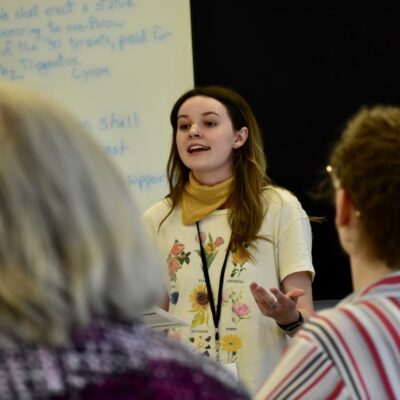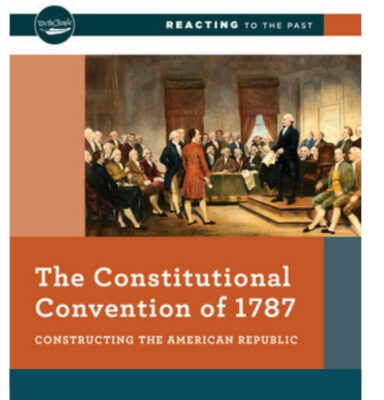Since 1998, I’ve been on the faculty of the Honors College at the University of Oklahoma. As students from every major on campus can join the Honors College, my classrooms tend to be very intellectually diverse. Students come to them with very different relationships to history in general and intellectual history in particular. So, since arriving here, I’ve looked for creative ways to teach intellectual history to students who may not otherwise be inclined to study it.
Back in 2014, I stumbled upon a reference in a book review to Reacting to the Past, an innovative curriculum that teaches history through elaborate role-playing games that had been developed by Mark Carnes, a historian at Barnard College. Googling around, I discovered that the way most people learn to teach reacting is by attending conferences put on by the Reacting Consortium, the organization that overseas and promotes Reacting to the Past. The next such conference happened to be at the University of Oregon, so I signed up and used some curriculum development funds to fly me out there. It was a terrific experience.

Students and faculty playing the Greenwich Village game at the Reacting Consortium’s 2019 Annual Institute.
https://reacting.barnard.edu/events
Though regional Reacting conferences like the one I attended have some informational sessions, attendees spend most of their time learning to teach Reacting by playing a game. I was assigned the role of the suffragist Inez Milholland in Greenwich Village, 1913
, a game in which a variety of radical activists and writers debate whether their efforts should focus on achieving women’s suffrage or winning the ongoing Paterson strike. Mark Carnes himself served as the Game Master (GM) of my game. It was a terrific experience, both enormously fun and really educational (even for a room full of faculty members). I left Eugene excited to bring Reacting to my Honors College; I’ve been teaching a Reacting to the Past course each fall since then. It’s become my single most popular class.
Though Reacting games concern all sorts of events, the very structure of the Reacting to the Past curriculum emphasizes the importance of ideas in history. Reacting games begin with a series of set-up sessions. These operate more or less like conventional classes. Students study material – including many primary sources – to familiarize themselves with the background of the game they are about to play. But the heart of Reacting to the Past are the game sessions, in which students are in character, playing assigned historical figures. Students need to understand the beliefs of the characters they play and employ them in debates and papers (which are all written in character). Though Reacting games tend to concern real events, one of their premises is that history is contingent. Things do not always turn out as they did in real life. For example, the first time I taught the Yalta Conference game, the Soviet delegation walked out, frustrated with the deal that the British and the Americans were giving them. Games conclude with a debriefing session in which the students, now out of character, and the professor discuss what went on in the game and why things turned out as they did, both in the classroom and in the actual past.
The year of the pandemic has been a challenging one for the Reacting community. The Reacting Consortium (on whose board I now sit) has had to cancel all our in-person conferences, including our big, annual national summer conference in New York. But we also went online. I took part in two online Reacting games last summer and I emerged prepared to teach my Reacting class last fall online. It turns out that Reacting via Zoom and Slack works very well!
I had originally planned to lead a short workshop on Reacting to the Past at S-USIH’s 2020 conference in Boston. There wouldn’t have been time to actually play a game, but I’d have hoped to pique people’s interest and encourage participants to attend a Reacting conference to learn more.
But once the S-USIH conference went online, I realized that I could offer a conference-like, online game experience to interested S-USIHites who want to learn about Reacting to the Past.

https://wwnorton.com/books/9780393640908
My online workshop will be taking place Friday to Sunday, April 16-18. We’ll have a preliminary session on Friday from 7:00 – 8:30 pm EDT. We’ll then have ninety-minute game sessions at 1:00 and 3:30 pm EDT on Saturday and at 1:00 pm on Sunday. We’ll finally wrap up with a ninety-minute discussion of the game and how to teach Reacting, in person and online, at 3:30 pm on Sunday.
We’ll be playing one of the games I GM’d online last fall: The Constitutional Convention of 1787. If you sign up, you’ll be asked to fill out a little questionnaire and will be assigned the role of a delegate to the Convention. You’ll receive your role sheets and gamebooks during the last week of March. The entire workshop (including a copy of the gamebook) is free of charge.
Though this workshop is principally designed to introduce participants to teaching Reacting to the Past, it will also be valuable for those with some experience in Reacting to learn how it works online.
We invite those interested in participating to email [email protected] by Wednesday 10 March 2021 in order to sign up. Registration is capped at 25 participants. We’ll follow up with Zoom links in April. This workshop will be capped at 25 participants, so if you’re interested, don’t hesitate in signing up!

0